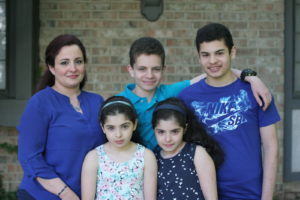Meet Riem
Riem’s Story
Riem is from Latakia, a major port city in Syria, and one of the last cities largely under government control at the time she lived there. “Since 2011, I had two suitcases packed, and if anything happened, I would take them and leave with my kids,” Riem said. At first, she would travel back and forth from Latakia to her parents’ house in Damascus when her city was under attack. In 2012, her home was bombed. When the Free Syrian Army attempted to overthrow the government, Riem knew it was time to leave. She fled with her four children to Egypt.
“My kids were so young. I was so afraid,” she said. “I told my husband ‘I don’t care. I have to leave.’”
After eight months of living in Egypt, Riem heard that the situation in Syria had improved. She returned– only to find that the violence was worse. Children and families risked stepping on mortars every time they left for work or school. She kept her children out of school for a year to protect them. She didn’t know where to go next. At the time, Syrian refugees could still travel to Turkey without a visa, so she fled again. In Turkey, she considered joining the other Syrians making the dangerous journey to Europe by sea.
“My sister said, “You’re crazy; you’re not supposed to go; the boat will capsize,’” Riem said.
“I said, ‘I don’t care. Let it capsize. If I go back, I’m going to die anyways. So, no. Let me risk this.’”
Fortunately, as an employee of the United Nations in Kenya, her sister was able to offer her a way out. Riem and her children went to live in Kenya, while she waited on her refugee status. A year later, Riem learned she was eligible to resettle in the United States.
“No one knew that America or the United States was open to refugees. People would tell me, the U.S. is not a good solution for you because they don’t pay for you like they do in Europe. I said, ‘I don’t care. I want a safe place. I don’t want people to pay for me all the time. I want to be dependent on myself.’”
Upon arrival in Indianapolis, Exodus introduced Riem and her family to a Welcome Team from Meridian Street United Methodist Church. Riem said they have played a large role in making her family feel at home. She is especially close to two of the members, and has already invited them over to her house for a dinner. She also works full-time at a marketing company and hopes to return to school to study nursing. “I’m feeling that I’m LIVING again,” she said.
Most importantly to Riem, her children have been able to enroll in school and return to their studies.
“Since 2012, we were on hold. I wouldn’t let my kids go to school regularly. I wouldn’t let them participate in after school activities, because you never knew what was going to happen,” she said. “They didn’t experience their childhood. Now we are starting to feel like what life was like.”
Although Riem is thankful to have a nephew in Indianapolis to help their family transition, her husband being at home in Syria still is her greatest worry.
“My kids talk to him on a daily basis on Skype,” she said. “They are young, but the boys, they really need their dad. They keep asking when he is going to come, but I say stop asking please, please stop asking because I don’t know. If I know, I would tell you. We just have to live with it for now.”
Riem petitioned for her husband immediately, but the process can take up to three years. She fears he will be forced to join the military before they can reunite.
“I’m not only concerned about my husband, I’m concerned about my husband’s life because of my kids also, not just because of me, and also the other people you love, you know, your house, everything you have. All these years you lived there, imagine all these destroyed.”
She hopes that people continue to advocate for Syrian refugees, especially as more countries close their borders to those seeking safety.
“As much as I tell you that Syrians are suffering, it’s even more.”


Exodus Refugee Immigration
2457 E. Washington Street, Suite A
Indianapolis, IN 46201
(317) 921-0836

